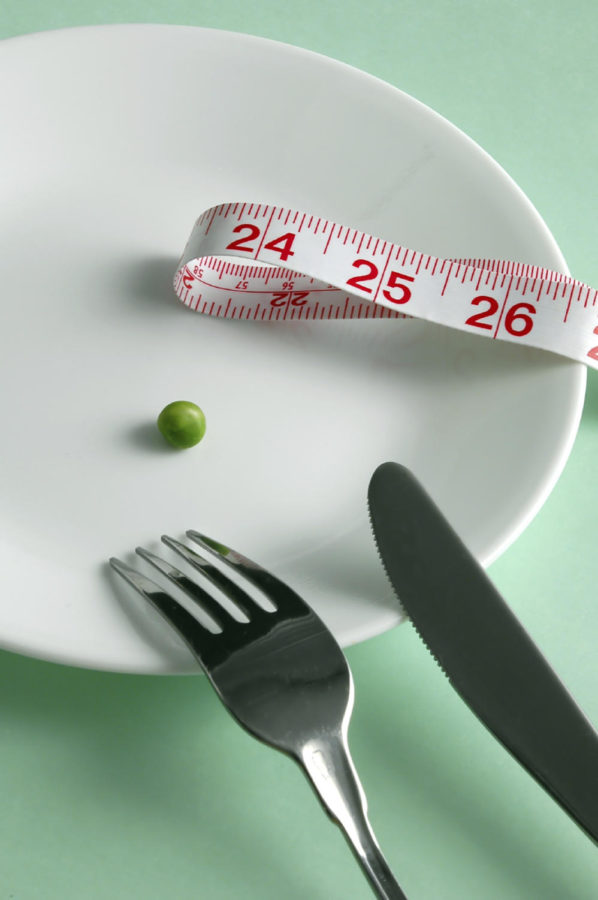Fad diets and their effects on physical health
March 11, 2020
Fad diets are a big weight loss trend. What some don’t know is that they are only a temporary fix in most cases and likely poor for your health.
Some of these diets include the ketogenic diet, Paleolithic diet and intermittent fasting.
The ketogenic, or keto diet, is a high-fat, low-carbohydrate diet that forces the body to burn fat instead of carbohydrates. This diet is also used to treat epilepsy in children.
The Paleolithic diet, or paleo diet, also referred to as the caveman diet, is the consumption of foods presumed to be eaten by humans in the Paleolithic era. These foods include fish, meat, fruits and vegetables. Processed products as well as dairy and grain are excluded.
Intermittent fasting is not focused on what you eat, but when you eat. Depending on what intermittent fasting schedule a person follows, the diet breaks up their hours or days into eating periods and fasting periods.
Matthew Rowling, associate professor in food science and human nutrition, said his initial reaction to these diets are they are terrible for you.
Rowling said the keto diet robs you from the nutrients that feed your brain.
“You are missing out on nutrient-dense foods,” Rowling said. “At the same time they are putting in their body things that are known to promote cardiovascular disease.”
The keto diet helps children with epilepsy because the ketone bodies that are produced in ketogenesis slow down the neural activity that causes seizures, Rowling said.
There is a higher risk of cardiovascular disease with these types of foods.
“When people go keto, they’re depriving themselves of carbohydrates, which taste good,” Rowling said. “When they eat the proteins and those types of things, they are not going for bland chicken breasts. They are going to eat more fatty types of foods cause it tastes better. They need that sensation.”
Student Wellness dietician Lisa Nolting works one-on-one with Iowa State students who have a variety of needs regarding nutrition. Nolting also coordinates the campus eating disorders treatment team and supervises a group of peer wellness educators who do health promotion and prevention programs.
Nolting said she considers herself a weight neutral dietician, which means she doesn’t view weight loss or weight gain as positive or negative. She said her job is more of a way to figure out how to help someone eat in a way that makes them feel healthy and happy.
When students doing these fad diets go to Nolting for help, her initial reaction is to ask why—what is driving the student to do this, what is the student hoping to achieve, where is the student getting their information from and many more questions so she can evaluate the situation.
“Part of my job as a dietician is to do an assessment to find out what’s going on overall medically as well as socially and emotionally,” Nolting said.
Nolting said when people are doing any type of diet that’s not intuitive, something where they’re using external cues to guide their food choices, 95 percent of the time they will regain that weight.
With these diets come problems. When someone is constantly losing and gaining back weight, their hormones fluctuate. It is not good for the body or the mind.
Nolting said she sees that when people go on keto diet, they are missing out on carbohydrates so they have very low energy. These people also have trouble sleeping at night because the body is not able to produce melatonin.
When people go off the paleo diet and reintroduce certain foods into their system, like dairy or grains, they might have some gastrointestinal distress.
With intermittent fasting, the dieters are so used to fasting throughout the day that it might take some time for them to retrain their hunger and fullness.
Paige Green is a registered dietician for Hy-Vee. She assists people with their diet plans and overall health goals.
“These diets are very black and white. Eliminate these food groups and eat only these,” Green said. “Or, keep carbs to this specific number, or don’t eat until this time. When diets give out strong rules, such as the three mentioned, people get hooked.”
Green said people will experience weight loss anytime more processed foods and sugars are cut from their daily food intake. It is important to talk to a dietitian and figure out some food alternatives or supplements to aid where your diet has been lacking.
Rowling, Nolting and Green recommend staying away from these fad diets and finding professional help if you are looking to lose weight.
Participating in these fad diets create a bad relationship between the consumer and food. It is best to get a professional’s opinion when wanting to lose weight or eat healthier.
For more information on getting in contact with a dietician, visit cyclonehealth.org or hy-vee.com.







